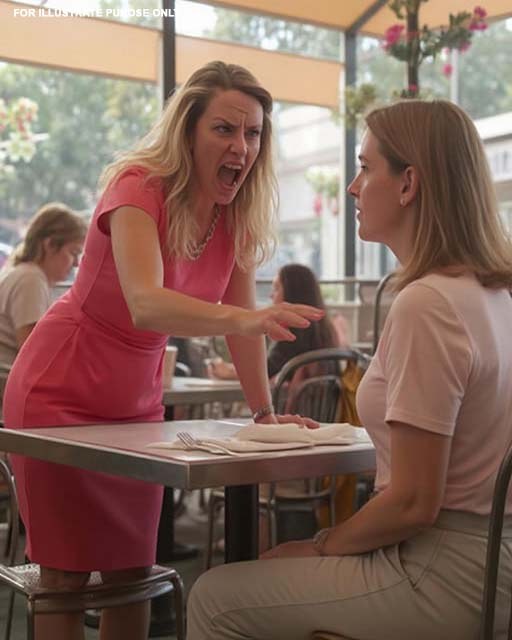I’m Lila, 22, hard of hearing since birth. My life has always moved in two languages—one with my voice, one with my hands. With my best friend Riley, who’s Deaf, signing is how we laugh, vent, and say the small, important things you can’t cram into a text.
That Tuesday, Hazelwood Café smelled like espresso and warm cinnamon. Riley was already there, curls bouncing as she grinned at something on her phone. I slid into the booth and signed, Sorry I’m late—traffic was a nightmare.
She rolled her eyes. I assumed you bailed so you wouldn’t hear about my sourdough disaster.
You tried again? I teased.
Don’t judge me. TikTok lied, she signed with theatrical offense.
A little boy at the next table watched us, wide-eyed and curious. I waved; he wiggled his fingers back, trying to copy. Riley smiled. Look at him. Tiny new signer in the wild.
His mother noticed a beat later. Her face pinched. She yanked his hands down. “Stop that. We don’t do that. It’s rude.”
My stomach dropped. We’ve had stares, questions, people treating ASL like a novelty. Open hostility still stings.
“Want to go?” Riley signed, smaller than usual.
No. We belong here too.
The mother stood, heels clicking, and marched over. “Excuse me,” she said through clenched teeth. “Could you stop with all the gesturing?”
“You mean sign language?” I asked.
“Whatever. It’s distracting. My son is trying to eat, and you’re waving your arms like windmills.”
“This is how we communicate,” I said, steady as I could. “There’s nothing disruptive about that.”
“Oh, please,” she scoffed. “It’s theatrical. Do it somewhere private.”
Her son tugged her sleeve. “Mom, stop. They weren’t doing anything wrong.”
She ignored him. “What kind of example are you setting? You’re encouraging him to think that’s normal.”
“It is normal,” I said. “ASL is a language used by millions.”
She rolled her eyes. “Everyone wants to be special. The rest of us just want to live our lives without accommodating your drama.”
The café had gone still. Riley sat upright, unreadable, but I could feel the hostility pressing in.
A familiar voice: “Is there a problem here?”
James, our favorite server, stood at our table, towel over his arm, calm but unbudging.
“Yes,” the woman snapped. “They’re making a scene. Tell them to stop.”
James lifted an eyebrow. “Ma’am, I’ve been watching. The only person causing a disturbance is you.”
“Excuse me?”
“Sign language isn’t disruptive,” he said evenly. “Berating people for talking? That is.”
“I don’t want my child exposed to—”
“To what?” James cut in. “Communication? Diversity? If that’s the issue, you might reconsider your approach to parenting.”
A couple near the window clapped. The sound spread like a small wave.
“We welcome everyone here,” James added. “We don’t tolerate discrimination.”
The woman flushed, blotchy red. “Come on, Nathan. We’re leaving.” She yanked his hand.
Nathan hesitated, then slipped from her grasp and stepped toward us. He looked up, earnest. Slowly, carefully, he signed, I’m sorry. She’s wrong.
My eyes burned.
Riley signed back, gentle. Thank you. You did nothing wrong.
He bit his lip. “How do you sign ‘friend’?”
Riley showed him, two hooked index fingers turning together. He mirrored her, delighted. “Friend,” he whispered, then hurried after his mom, pausing at the door to sign it one more time.
James returned with two warm cookies. “On the house. I’m sorry you had to deal with that.”
“You didn’t have to step in,” I said, voice wobbling. “But you did.”
“My older sister’s Deaf,” he said with a small smile. “I know this dance.”
We sat for a moment, letting the room fill back up with clinks and chatter. An older woman leaned over as she passed: “Your language is beautiful. Thank you for sharing it.”
Riley squeezed my hand. You okay?
Because of you. And James. And that brave kid. I smiled. Yeah.
We finished our cookies slowly, the sweetness landing where the bruise had been. Outside, the sun was honey-warm. We lingered on the sidewalk.
Same time next week? Riley signed.
“Always,” I said. “No matter who’s watching.”
On the walk to my car, I kept thinking about Nathan—his curiosity, his apology, the way he learned “friend” like it was a secret key. We won’t change everyone. But we can plant seeds. With luck, they grow into a world where nobody is told their language is “disruptive” for existing.

